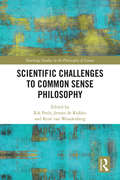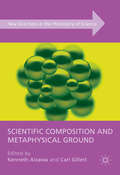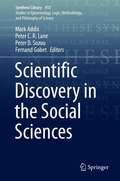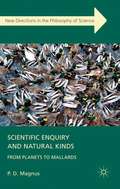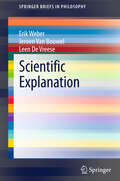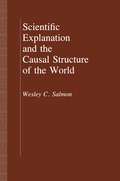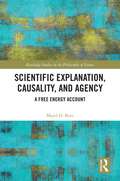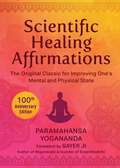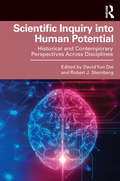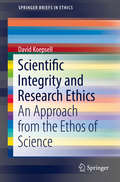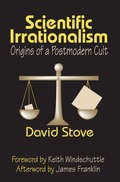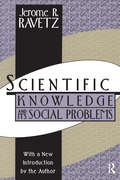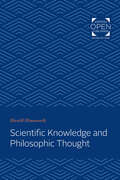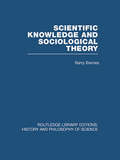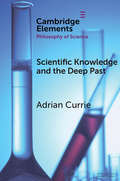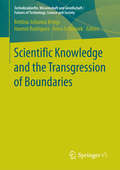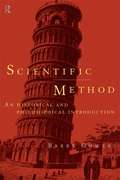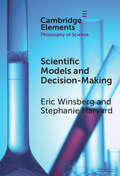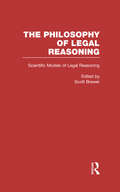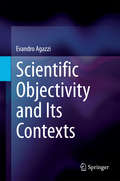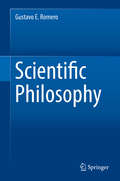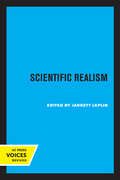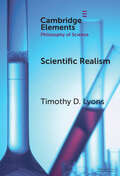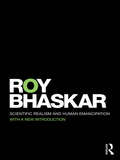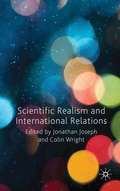- Table View
- List View
Scientific Challenges to Common Sense Philosophy (Routledge Studies in the Philosophy of Science)
by Rik Peels; Jeroen de Ridder; René van WoudenbergCommon sense philosophy holds that widely and deeply held beliefs are justified in the absence of defeaters. While this tradition has always had its philosophical detractors who have defended various forms of skepticism or have sought to develop rival epistemological views, recent advances in several scientific disciplines claim to have debunked the reliability of the faculties that produce our common sense beliefs. At the same time, however, it seems reasonable that we cannot do without common sense beliefs entirely. Arguably, science and the scientific method are built on, and continue to depend on, common sense.This collection of essays debates the tenability of common sense in the face of recent challenges from the empirical sciences. It explores to what extent scientific considerations—rather than philosophical considerations—put pressure on common sense philosophy. The book is structured in a way that promotes dialogue between philosophers and scientists. Noah Lemos, one of the most influential contemporary advocates of the common sense tradition, begins with an overview of the nature and scope of common sense beliefs, and examines philosophical objections to common sense and its relationship to scientific beliefs. Then, the volume features essays by scientists and philosophers of science who discuss various proposed conflicts between commonsensical and scientific beliefs: the reality of space and time, about the nature of human beings, about free will and identity, about rationality, about morality, and about religious belief. Notable philosophers who embrace the common sense tradition respond to these essays to explore the connection between common sense philosophy and contemporary debates in evolutionary biology, neuroscience, physics, and psychology.
Scientific Composition and Metaphysical Ground
by Kenneth Aizawa Carl GillettWe find "vertical"relations in many different realms, whether between atoms and molecules, wordsand sentences, neurons and brains, or individuals and societies. This book isthe first to bring together, and comparatively assess, the exciting array ofphilosophical approaches to vertical relations that have independently sprungup in analytic metaphysics, the metaphysics of mind, and the philosophy ofscience. Analytic metaphysicians have recentlyfocused on a relation of 'Ground' that is claimed to be found in aesthetics,ethics, logic, mathematics, science, and semantics. Metaphysicians of mind have focussed on avertical relation of 'realization' between properties, whilst philosophers ofscience associated with the rise of the 'New Mechanism' have renewed interestin vertical relations of scientific composition found in so-called "mechanisticexplanations". This volume analyses the inter-relations between these differentapproaches to spark a range of new debates, including whether the variousframeworks for vertical relations are independent, complementary or in even competition.
Scientific Discovery in the Social Sciences (Synthese Library #413)
by Fernand Gobet Mark Addis Peter C. R. Lane Peter D. SozouThis volume offers selected papers exploring issues arising from scientific discovery in the social sciences. It features a range of disciplines including behavioural sciences, computer science, finance, and statistics with an emphasis on philosophy.The first of the three parts examines methods of social scientific discovery. Chapters investigate the nature of causal analysis, philosophical issues around scale development in behavioural science research, imagination in social scientific practice, and relationships between paradigms of inquiry and scientific fraud. The next part considers the practice of social science discovery. Chapters discuss the lack of genuine scientific discovery in finance where hypotheses concern the cheapness of securities, the logic of scientific discovery in macroeconomics, and the nature of that what discovery with the Solidarity movement as a case study. The final part covers formalising theories in social science. Chapters analyse the abstract model theory of institutions as a way of representing the structure of scientific theories, the semi-automatic generation of cognitive science theories, and computational process models in the social sciences.The volume offers a unique perspective on scientific discovery in the social sciences. It will engage scholars and students with a multidisciplinary interest in the philosophy of science and social science.
Scientific Enquiry and Natural Kinds
by P. D. MagnusSome scientific categories seem to correspond to genuine features of the world and are indispensable for successful science in some domain; in short, they are natural kinds . This book gives a general account of what it is to be a natural kind and puts the account to work illuminating numerous specific examples.
Scientific Explanation
by Jeroen Van Bouwel Leen De Vreese Erik WeberWhen scientist investigate why things happen, they aim at giving an explanation. But what does a scientific explanation look like? In the first chapter (Theories of Scientific Explanation) of this book, the milestones in the debate on how to characterize scientific explanations are exposed. The second chapter (How to Study Scientific Explanation?) scrutinizes the working-method of three important philosophers of explanation, Carl Hempel, Philip Kitcher and Wesley Salmon and shows what went wrong. Next, it is the responsibility of current philosophers of explanation to go on where Hempel, Kitcher and Salmon failed. However, we should go on in a clever way. We call this clever way the pragmatic approach to scientific explanation and clarify briefly what this approach consists in. The third chapter (A Toolbox for Describing and Evaluating Explanatory Practices) elaborates the pragmatic approach by presenting a toolbox for analysing scientific explanation. In the last chapter (Examples of Descriptions and Evaluations of Explanatory Practices) the approach is illustrated with real-life examples of scientists aiming at explaining. This book can be used as a textbook for intermediate philosophy of science courses and is also valuable as "suggested reading" for introductory courses in philosophy of science. The way the book is set up makes it an excellent study and research guide for advanced (MA and PhD) students that work on the topic of scientific explanation. Finally, it is a handy source and reference book for senior researchers in the field of scientific explanations and - more generally - for all philosophers of science.
Scientific Explanation and the Causal Structure of the World
by Wesley C. SalmonThe philosophical theory of scientific explanation proposed here involves a radically new treatment of causality that accords with the pervasively statistical character of contemporary science. Wesley C. Salmon describes three fundamental conceptions of scientific explanation--the epistemic, modal, and ontic. He argues that the prevailing view (a version of the epistemic conception) is untenable and that the modal conception is scientifically out-dated. Significantly revising aspects of his earlier work, he defends a causal/mechanical theory that is a version of the ontic conception. Professor Salmon's theory furnishes a robust argument for scientific realism akin to the argument that convinced twentieth-century physical scientists of the existence of atoms and molecules. To do justice to such notions as irreducibly statistical laws and statistical explanation, he offers a novel account of physical randomness. The transition from the "reviewed view" of scientific explanation (that explanations are arguments) to the causal/mechanical model requires fundamental rethinking of basic explanatory concepts.
Scientific Explanation, Causality, and Agency: A Free Energy Account (Routledge Studies in the Philosophy of Science)
by Majid D. BeniThis book draws on advances in computational neuroscience and theoretical biology to provide a clear and accessible agentive account of the nature of causality and scientific explanations.Instead of attempting to establish the elements of scientific explanation, such as causality, in a reality unadulterated by a human perspective, this book relies on scientific facts about cognition to describe the structure of agency from a distinctly human perspective. The book draws on the Free Energy Principle to reinforce the agency theory of causality and extend it to an account of explanation as well. This principle not only provides a theoretical account of how self-organising systems engage with the causal structure of the environment, but it also offers a viable notion of agency and is compatible with the projectivist aspects of the agency theory.Scientific Explanation, Causality, and Agency will appeal to researchers and advanced students working in philosophy of science, philosophy of cognitive science, epistemology, computational neuroscience, and theoretical biology.
Scientific Healing Affirmations: The Original Classic for Improving One's Mental and Physical State (100th Anniversary Edition)
by Paramahansa Yogananda&“If the mind can produce ill health, it can also produce good health.&” These are the words of Parahamansa Yogananda—beloved Hindu yogi, guru, and monk, and author the international bestseller of The Autobiography of a Yogi. Yogananda was also one of the first voices to recognize the power of positivity with Scientific Healing Affirmations. First published in 1924, this groundbreaking book describes the pathway to achieve wellness and clarity through a series of time-honored affirmations derived from Eastern spiritual philosophy. Far ahead of its time, this book was the one of the first to highlight the scientific correlations between positivity and bolstering your mental, physical, and spiritual health. Organized into dynamic, easily digestible sections, this powerfully succinct book teaches how positive affirmations can help you: Prevent physical, mental, and physical diseaseReduce the impact of negative emotionsAvoid defeatist self-talkChoose your words carefullyBuild willpower and confidenceMeditate and hone your focusLive authenticallyAchieve and maintain inner peaceAwaken your life energyAnd create lasting positive change By working through this time-tested book, you can reduce suffering for you and others, unleash your inner potential, and begin on the path toward true and enduring happiness.
Scientific Inquiry into Human Potential: Historical and Contemporary Perspectives Across Disciplines
by David Yun Dai and Robert J. SternbergScientific Inquiry into Human Potential explores the intellectual legacy and contemporary understanding of scientific research on human intelligence, performance, and productivity. Across nineteen chapters, some of the most eminent scholars of learning and psychology recount how they originated, distinguished, measured, challenged, and adapted their theories on the nature and nurture of human potential over decades of scientific research. These accessible, autobiographical accounts cover a spectrum of issues, from the biological underpinnings and developmental nature of human potential to the roles of community, social interaction, and systematic individual differences in cognitive and motivational functioning. Researchers, instructors, and graduate students of education, psychology, sociology, and biology will find this book not only historically informative but inspiring to their own ongoing research journeys, as well.
Scientific Integrity and Research Ethics
by David KoepsellThis book is an easy to read, yet comprehensive introduction to practical issues in research ethics and scientific integrity. It addresses questions about what constitutes appropriate academic and scientific behaviors from the point of view of what Robert Merton called the "ethos of science. " In other words, without getting into tricky questions about the nature of the good or right (as philosophers often do), Koepsell's concise book provides an approach to behaving according to the norms of science and academia without delving into the morass of philosophical ethics. The central thesis is that: since we know certain behaviors are necessary for science and its institutions to work properly (rather than pathologically), we can extend those principles to guide good behaviors as scientists and academics. The Spanish version of this book was commissioned by the Mexican National Science Foundation (CONACyT) and is being distributed to and used by Mexican scientists in a unique, national plan to improve scientific integrity throughout all of Mexico. Available now in English, the examples and strategies employed can be used throughout the English speaking research world for discussing issues in research ethics, training for scientists and researchers across disciplines, and those who are generally interested in ethics in academia.
Scientific Irrationalism: Origins of a Postmodern Cult
by David StoveLittle known outside his native Australia, David Stove was one of the most illuminating and brilliant philosophical essayists of his era. A fearless attacker of intellectual and cultural orthodoxies, Stove left powerful critiques of scientific irrationalism, Darwinian theories of human behavior, and philosophical idealism.Since its inception in the 1940s, the field of science studies, originally intended to bridge the gap between science and the humanities, has been the center of controversy and debate. The most notable figures in this debate are Thomas Kuhn and Karl Popper. In Scientific Irrationalism, now available in paperback, David Stove demonstrates how extravagant has been the verbiage wasted on this issue and how irrational the combatants have been. He shows that Kuhn and Popper share considerable common ground. Stove argues that the problems all reside in the reasoning of the critics. He identifies the logical mistakes and conceptual allusions made by Kuhn and Popper and their supporters, as well as their collective dependency on a single argument made by the philosopher of the Scottish Enlightenment, David Hume. He then demonstrates how little potency that argument actually has for the claims of science.In his foreword, Keith Windschuttle explains the debate surrounding the field of science studies and explores David Stove's contribution as well as his lack of recognition. In an afterword, James Franklin discusses reactions to Stove's work.
Scientific Knowledge and Its Social Problems
by Jerome R. RavetzScience is continually confronted by new and difficult social and ethical problems. Some of these problems have arisen from the transformation of the academic science of the prewar period into the industrialized science of the present. Traditional theories of science are now widely recognized as obsolete. In Scientific Knowledge and Its Social Problems (originally published in 1971), Jerome R. Ravetz analyzes the work of science as the creation and investigation of problems. He demonstrates the role of choice and value judgment, and the inevitability of error, in scientific research. Ravetz's new introductory essay is a masterful statement of how our understanding of science has evolved over the last two decades.
Scientific Knowledge and Philosophic Thought
by Harold HimsworthOriginally published in 1986. Are there two kinds of problems—the scientific and the philosophic—each requiring different methods for solution? Or are there, rather, two different ways of approaching a problem, each yielding a different answer according to the method used? Biomedical researcher Sir Harold Himsworth urges scientists not to shy away from using scientific methods to grapple with problems traditionally accepted as belonging to the province of philosophy. The difference between science and philosophy lies not in the problems to which they are directed, Himsworth argues, but rather in the methods they use for solving them. To the scientist, a proposition is something to be investigated; to the philosopher, something to be accepted as a basis for thought. Since the development of the scientific method, substantial progress has been made toward mastering problems in the natural environment. If we are ever to attain a degree of control over problems that derive from human activities, Himsworth claims that we only succeed by approaching them in a comparably objective way.
Scientific Knowledge and Sociological Theory (Routledge Library Editions: History & Philosophy of Science)
by Barry BarnesOriginally published in 1974. Scientific Knowledge and Sociological Theory centres on the problem of explaining the manifest variety and contrast in the beliefs about nature held in different groups and societies. It maintains that the sociologist should treat all beliefs symmetrically and must investigate and account for allegedly "correct" or "scientific" beliefs just as he would "incorrect" or "unscientific" ones. From this basic position a study of scientific beliefs is constructed. The sociological interest of such beliefs is illustrated and a sociological perspective upon scientific change is developed.
Scientific Knowledge and the Deep Past: History Matters (Elements in the Philosophy of Science)
by Adrian CurrieHistorical sciences like paleontology and archaeology have uncovered unimagined, remarkable and mysterious worlds in the deep past. How should we understand the success of these sciences? What is the relationship between knowledge and history? In Scientific Knowledge and the Deep Past: History Matters, Adrian Currie examines recent paleontological work on the great changes that occurred during the Cretaceous period - the emergence of flowering plants, the splitting of the mega-continent Gondwana, and the eventual fall of the dinosaurs - to analyse the knowledge of historical scientists, and to reflect upon the nature of history. He argues that distinctively historical processes are 'peculiar': they have the capacity to generate their own highly specific dynamics and rules. This peculiarity, Currie argues, also explains the historian's interest in narratives and stories: the contingency, complexity and peculiarity of the past demands a narrative treatment. Overall, Currie argues that history matters for knowledge.
Scientific Knowledge and the Transgression of Boundaries
by Bettina-Johanna Krings Hannot Rodríguez Anna SchleisiekThe aim of this book is to understand and critically appraise science-based transgression dynamics in their whole complexity. It includes contributions from experts with different disciplinary backgrounds, such as philosophy, history and sociology. Thus, it is in itself an example of boundary transgression. Scientific disciplines and their objects have tended to be seen as permanent and distinct. However, science is better conceived as an activity that constantly surpasses, erases and rebuilds all kinds of boundaries, either disciplinary, socio-ethical or ecological. This transgressive capacity, a characteristic trait of science and its applications, defines us as "knowledge societies. " However, scientific and technological developments are also sources of serious environmental and social concerns.
Scientific Method: A Historical and Philosophical Introduction
by Barry GowerThe central theme running throughout this outstanding new survey is the nature of the philosophical debate created by modern science's foundation in experimental and mathematical method. More recently, recognition that reasoning in science is probabilistic generated intense debate about whether and how it should be constrained so as to ensure the practical certainty of the conclusions drawn. These debates brought to light issues of a philosophical nature which form the core of many scientific controversies today. Scientific Method: A Historical and Philosophical Introduction presents these debates through clear and comparative discussion of key figures in the history of science. Key chapters critically discuss* Galileo's demonstrative method, Bacon's inductive method, and Newton's rules of reasoning* the rise of probabilistic `Bayesian' methods in the eighteenth century* the method of hypotheses through the work of Herschel, Mill and Whewell* the conventionalist views of Poincaré and Duhem* the inductivism of Peirce, Russell and Keynes* Popper's falsification compared with Reichenbach's enumerative induction* Carnap's scientific method as Bayesian reasoningThe debates are brought up to date in the final chapters by considering the ways in which ideas about method in the physical and biological sciences have affected thinking about method in the social sciences. This debate is analyzed through the ideas of key theorists such as Kuhn, Lakatos, and Feyerabend.
Scientific Models and Decision Making (Elements in the Philosophy of Science)
by Eric Winsberg Stephanie HarvardThis Element introduces the philosophical literature on models, with an emphasis on normative considerations relevant to models for decision-making. Chapter 1 gives an overview of core questions in the philosophy of modeling. Chapter 2 examines the concept of model adequacy for purpose, using three examples of models from the atmospheric sciences to describe how this sort of adequacy is determined in practice. Chapter 3 explores the significance of using models that are not adequate for purpose, including the purpose of informing public decisions. Chapter 4 provides a basic framework for values in modelling, using a case study to highlight the ethical challenges in building models for decision making. It concludes by establishing the need for strategies to manage value judgments in modelling, including the potential for public participation in the process.
Scientific Models of Legal Reasoning: Economics, Artificial Intelligence, and the Physical Sciences (Philosophy of Legal Reasoning: A Collection of Essays by Philosophers and Legal Scholars #No. 5)
by Scott BrewerFirst published in 1998. Routledge is an imprint of Taylor & Francis, an informa company.
Scientific Objectivity and Its Contexts
by Evandro AgazziThe first part of this book is of an epistemological nature and develops an original theory of scientific objectivity, understood in a weak sense (as intersubjective agreement among the specialists) and a strong sense (as having precise concrete referents). In both cases it relies upon the adoption of operational criteria designed within the particular perspective under which any single science considers reality. The "object" so attained has a proper ontological status, dependent on the specific character of the criteria of reference (regional ontologies). This justifies a form of scientific realism. Such perspectives are also the result of a complex cultural-historical situation. The awareness of such a "historical determinacy" of science justifies including in the philosophy of science the problems of ethics of science, relations of science with metaphysics and social dimensions of science that overstep the traditional restriction of the philosophy of science to an epistemology of science. It is to this "context" that the second part of the book is devoted.
Scientific Philosophy
by Gustavo E. RomeroThis textbook presents the basics of philosophy that are necessary for the student and researcher in science in order to better understand scientific work. The approach is not historical but formative: tools for semantical analysis, ontology of science, epistemology, and scientific ethics are presented in a formal and direct way. The book has two parts: one with the general theory and a second part with application to some problems such as the interpretation of quantum mechanics, the nature of mathematics, and the ontology of spacetime. The book addresses questions such as "What is meaning?", "What is truth?", "What are truth criteria in science?", "What is a theory?", "What is a model?" "What is a datum?", "What is information?", "What does it mean to understand something?", "What is space?", "What is time?", "How are these concepts articulated in science?" "What are values?" "What are the limits of science?", and many more. The philosophical views presented are "scientific" in the sense that they are informed by current science, they are relevant for scientific research, and the method adopted uses the hypothetical-deductive approach that is characteristic of science. The results and conclusions, as any scientific conclusion, are open to revision in the light of future advances. Hence, this philosophical approach opposes to dogmatic philosophy. Supported by end-of-chapter summaries and a list of special symbols used, the material will be of interest for students and researchers in both science and philosophy. The second part will appeal to physicists and mathematicians.
Scientific Realism
by Jarrett LeplinThis title is part of UC Press's Voices Revived program, which commemorates University of California Press’s mission to seek out and cultivate the brightest minds and give them voice, reach, and impact. Drawing on a backlist dating to 1893, Voices Revived makes high-quality, peer-reviewed scholarship accessible once again using print-on-demand technology. This title was originally published in 1984.
Scientific Realism (Elements in the Philosophy of Science)
by Timothy D. LyonsThe scientific realism debate directly addresses the relation between human thought and the reality in which it finds itself. A core question: can we justifiably believe that science accurately describes the reality that lies beneath the limits of human experience? Exploring this question, the Element begins at the most foundational level of scientific realism, the endeavor to justify belief in the existence of unobservables by way of abduction. Raising anti-realist challenges, some much discussed in the literature but also some generally overlooked, it works its way toward more refined variants of scientific realism. Because it takes scientific realism to be the default position of many – scientific realists themselves often assuming it is the default position of scientists – the emphasis will be on the challenges. Those challenges will also motivate the variants of scientific realism traced. The Element concludes with an articulation of the author's own position, Socratic scientific realism.
Scientific Realism and Human Emancipation (Classical Texts in Critical Realism (Routledge Critical Realism))
by Roy BhaskarFollowing on from Roy Bhaskar’s first two books, A Realist Theory of Science and The Possibility of Naturalism, Scientific Realism and Human Emancipation, establishes the conception of social science as explanatory—and thence emancipatory—critique. Scientific Realism and Human Emancipation starts from an assessment of the impasse of contemporary accounts of science as stemming from an incomplete critique of positivism. It then proceeds to a systematic exposition of scientific realism in the form of transcendental realism, highlighting a conception of science as explanatory of a structured, differentiated and changing world. Turning to the social domain, the book argues for a view of the social order as conditioned by, and emergent from, nature. Advocating a critical naturalism, the author shows how the transformational model of social activity together with the conception of social science as explanatory critique which it entails, resolves the divisions and dualisms besetting orthodox social and normative theory: between society and the individual, structure and agency, meaning and behavior, mind and body, reason and cause, fact and value, and theory and practice. The book then goes on to discuss the emancipatory implications of social science and sketches the nature of the depth investigation characteristically entailed. In the highly innovative third part of the book Roy Bhaskar completes his critique of positivism by developing a theory of philosophical discourse and ideology, on the basis of the transcendental realism and critical naturalism already developed, showing how positivism functions as a restrictive ideology of and for science and other social practices.
Scientific Realism and International Relations
by Jonathan Joseph Colin WightCritical and scientific realism have emerged as important perspectives on international relations in recent years. The attraction of these approaches lies in the claim that they can transcend the positivism vs postpositivism divide. This book demonstrates the vitality of this approach and the difference that 'realism' makes.
